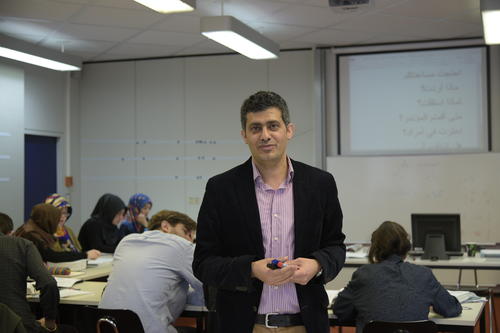“Language opens doors – and hearts”
Hamed Al-Drubi teaches Arabic at the Language Center and volunteers to help refugees
Nov 27, 2015
Hamed Al-Drubi is one of three Arabic language instructors at the Language Center at Freie Universität.
Image Credit: Annika Middeldorf
When Hamed Al-Drubi goes to teach his class, he pulls a blue handcart behind him. Stacked on it are a dozen Arabic dictionaries, each of them almost 1,500 pages long and weighing in at more than two kilograms. Students of Islamic studies use the dictionaries to do things like translating centuries-old texts into German. Al-Drubi, who is originally from Jordan, teaches his native language in class, but that isn’t all. “I want to do more than just explain Arabic grammar,” he says.
Together with his colleagues Nizar Romdhane and Bouchra Laun, who also teach Arabic at the Language Center, Al-Drubi offers a workshop for people who are helping out as part of refugee initiatives. In the workshop he includes an introduction to the Syrian dialect, a version of Standard Arabic. The goal of the workshop is not to master the language fluently, Al-Drubi says: “Language opens doors – and hearts. When someone speaks a couple words of Arabic, it is understood primarily as a gesture.” The workshop also covers the social and cultural backgrounds of the Arab and Islamic world.
Accompanying and advising refugees during everyday life at the university is part of the Welcome to Freie Universität Berlin program, which was launched in October 2015. Language plays a particularly important role here. For refugees who are interested in studying at a German university, the German language is the key to self-determination, and it is one aspect of qualifying for a degree program. In turn, there are many people who are committed to helping refugees and want to learn their language. Doctoral candidates from the Berlin Graduate School Muslim Cultures and Societies (BGSMCS) also help refugees with their language skills in Arabic, Persian (Farsi), Turkish, or Urdu. One example is the project entitled “Making Forms Understandable,” in which documents are translated and explained.
Great Interest in Arabic
Learning to understand each other is a goal that Al-Drubi has been pursuing in the more than 15 years that he has been teaching Arabic. In the late 1990s, very few people were interested in the language, he explains. And then came September 11, 2001; the attacks in the United States brought a sudden surge of interest in Arabic. “All of a sudden, people wanted to learn more about the Arab world – and they wanted to learn the language, too,” Al-Drubi says. And now that thousands of refugees – most of them currently from Syria – have arrived in Germany looking for a better life, there is even more interest in the language.
Arabic language courses offered as part of the general professional skills (allgemeine Berufsvorbereitung, ABV) field, in which students enrolled in bachelor’s degree programs can acquire additional skills, are in particular demand among students of Freie Universität this winter semester. “We offer a wide range of classes for ABV, but we don’t have enough capacity to guarantee a spot for every student,” says Ruth Tobias, head of the Language Center. Three Arabic language instructors currently work at the Language Center of Freie Universität. “I’m even happier that our instructors are not only highly qualified, but also very dedicated and involved,” Tobias says, pointing out that their volunteer activities do not go without saying.
Only Dialect Is Used in Everyday Life
Al-Drubi and his colleagues are receiving increasingly more visits these days from refugees who knock on their office door. “They ask us about language classes, tandem partners, or just how to get to the service center,” Al-Drubi says. Because he speaks the Syrian dialect, he is in especially high demand as a contact person. “People always speak in dialect for their everyday communications. Standard Arabic is only used for academic purposes or official occasions,” he says.
Al-Drubi’s family lives just 15 kilometers away from the Syrian border. Many Syrian refugees arrived there four years ago, and about 100,000 are currently housed at a camp. “The debate that is currently under way in Germany is already behind us,” Al-Drubi says. He travels to his former home once a year. Last summer, he talked to a taxi driver there about the refugee situation. The driver interrupted him, saying, “Please don’t call them refugees. They are our guests.” Al-Drubi says he was touched to hear it.
Further Information
"Welcome to Freie Universität Berlin" is a package of academic support services for individuals who have fled their homes in crisis zones and who are interested in studying at a German university. Detailed information about the program can be found on the website www.fu-berlin.de/en/welcome.
- Beginning in December 2015 the Language Center of Freie Universität is offering office hours in Arabic, English, and German for refugees who would like support with bureaucratic formalities related to studying at a German university.
- Members of the university who wish to volunteer to help refugees learn German can participate in one-day workshops on German in everyday life („Deutsch im Alltag. Grundinformationen für das Ehrenamt").

